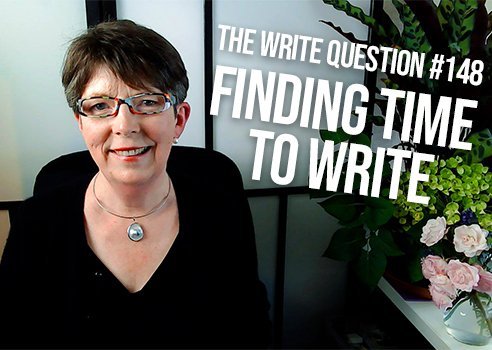Viewing time: 4 mins. 35 secs
The Write Question is a weekly video podcast about writing that I started in 2017 and that ran, more or less weekly, until April 2022. This is a republication of issue #148, which discusses how to squeeze in writing time. The post first ran on July 10/20.
Transcript:
How do you find more time to write? That’s the topic I’m addressing today in The Write Question. I’m Daphne Gray-Grant, the Publication Coach, still in pandemic mode.
I have a question from Mildred Strominski, a writer based in Nanaimo, British Columbia. Here’s what she’s asked by email…
“For the past three months, I’ve been caring for my elderly mother in her home. She needs 24-hour assistance, but the long-term care homes where she lives are a disaster zone because of COVID. Another wrinkle: I’m an extreme introvert and I find it hard to deal with many medical people and her church friends, and the resulting lack of privacy that depletes my energy. Often, I’m interrupted and find time to write only at the end of the day when I’m simply too exhausted. What do you suggest that I do?”
Thanks for your question, Mildred. Oh, my goodness, I really feel for you. COVID has upended many of our lives and made writing extra tough for anyone with very young children or elderly parents. Understand that this is NOT your fault! Please don’t blame yourself or think that you are somehow inadequate. You’re facing the very definition of a difficult situation.
So here is what I suggest: Make your writing commitment exceptionally SMALL.
For reasons I’ve never understood, many people seem to think that unless they’re able to devote a minimum of an hour per day to writing, they are not achieving enough. This is NOT true! And, in fact, it’s not wise, either.
You’re far wiser to write for a small amount of time every day than to write for a large amount, infrequently, even if your word count is exactly the same. Why? You stay better connected with your writing project this way.
As well, if writing is something small and unintimidating, you’re far less likely to want to procrastinate about it. Tell yourself you need to write for an hour and you may get scared. It’s going to seem hard, intimidating and maybe even boring. Tell yourself you need to write for five minutes and you’re far more likely to say, ‘sure, I can do that. After all, it’s only five minutes.’
And I have one other tip for you, Mildred. Do your writing first thing in the day if you can. As you said in your question to me, at the end of the day, you’re simply too exhausted to write. This doesn’t make you inadequate or disorganized! It makes you a normal human being who’s trying to look after her elderly mom. That’s a hard job! Anyone would be tired after a day of that kind of work.
So, try to earmark your five minutes — just five minutes —for writing, early in the day, before you become exhausted. I’m not suggesting that you get up at 4 am to do this, by the way! Perhaps you could time your five minutes with a visit from one of your mother’s church friends. They could attend to her needs while you were in another room — with the door shut and headphones on — writing.
And if these friends don’t understand the importance of writing to you, make up something that will resonate with them. Perhaps you need to work on your mother’s finances. Or deal with family correspondence. Or organize family photos. Hey, you might get 20 minutes that way! Tell them something that will inspire them to want to leave you alone.
But it’s really important that you do this writing early enough in the day so that you have the energy for it.
Finally, let me wrap up with a quote from the American-Armenian writer Emily Maroutian: “A tree that refuses water and sunlight for itself, can’t bear fruits for others.”
Mildred, some 15 years ago I looked after my own mother for about four months after she’d had a heart attack that eventually killed her. It was tough for me to find the time for myself in those days because my triplet children were only 11 years old and I had my own business to run as well.
I never regretted the time I spent with my mother, but I knew I needed to reserve a little of time for myself. I did that first thing in the day — before anyone else was awake. I’m sure you can find some time for yourself, too, even if you need to ask others for help to do that.
*
If you’d like to learn more about how to make writing a happier and more rewarding process, check out my latest book Your Happy First Draft. I don’t sell it in bookstores or via Amazon. The only place to buy it is on my website, link on the screen below and in the show notes.


